1976 - Year in SF&F: Reviews
|
THE WONDER TIMELINE: SF&F RETROSPECTIVE Read other issues here ---------------------------------------------- Isaac Asimov "The Bicentennial Man" © Stellar # 2, 1976 The Bicentennial Man and Other Stories, 1976 --novelette : 1977 Hugo W --novelette : 1977 Nebula W --novelette : 1977 Locus W --novelette : 1999 Locus All-Time Poll /5 --/ cool sf novella A little trivia: "The Bicentennial Man " is the third most anthologised of all the Hugo/Nebula winning short fiction (beaten only by Harlan Ellison's "'Repent, Harlequin!' Said the Ticktockman", and by the original shorter version of Daniel Keyes' "Flowers for Algernon"). Robert Silverberg expanded the story to a novel "The Positronic Man" and it was filmed in 1999 starring Robin Williams. The idea is that a robot declares himself legally human and is allowed to die a "natural death" at the end of his cycle. I personally found the story emotionally uninvolving and dry (a better word for "boring") in a typical Asimov fashion. Of course, it is a dignified treatise in itself, as well. review: 09-Jul-06 (read in 1988) 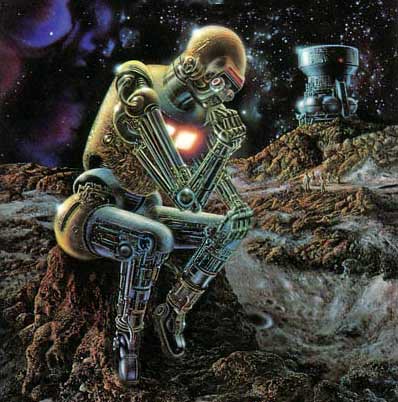 (art copyright: Donato Giancola) ----------------------------------------------  Barrington J. Bayley "The Cabinet of Oliver Naylor" © New Worlds # 10, 1976 The Knights of the Limits, 1979 --/ third place space sf story --/ idea award --/ wonder award --/ style award --/ awesome scale This story is a sudden revelation among the average contents of the "New Worlds" collection (this was already a book, not a magazine). Barrington Bayley is not only better, he is lethally good. After reading his stories, the joy of reading any other writer's honest effort pales in comparison and does not hook you any more. He will spoil you and show you what really inventive and cool writing is. In this off-beat (and seriously GRAND) tale we have Victorian design and culture, spaceships travelling with untinkable speeds and the metaphysical ramifications worthy of the late PKD theories. Witness these words from the "Cheap Truth": "His best work has an eerie sense of dark complexity. To read a work like "The Cabinet of Oliver Naylor" is to be simultaneously enlightened and bewildered, to receive a Zen knock on the head; it is the literary equivalent of psilocybin. It is, in fact, why science fiction was invented." review: 25-Oct-06 (read in 2001) ---------------------------------------------- 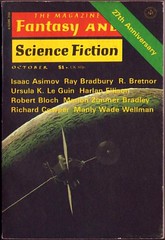 Robert Bloch "A Case Of The Stubborns" © F&SF, Oct 1976 Such Stuff As Screams Are Made Of, 1979 --/ cool f story --/ humour award "Cantankerous grandpa won't believe he is dead, but gets up the following morning, as if it never happened - causing consternation (to say the least!) for the family. He keeps coming to meals and demands service. Even the Reverend can't convince him and finally his family resorts to voodoo." Fun and whimsical story, it was made into a TV Episode in "Tales from the Dark Side". review: 26-Oct-06 (read in 2001) ---------------------------------------------- In the ever-growing sea of SF paperbacks we observe F. M. Busby's monumental opus (sticking out): 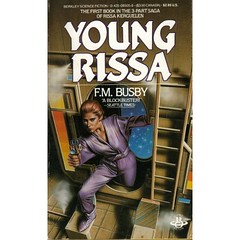 F. M. Busby "Young Rissa" (nv) (also as "Rissa Kerguellen") (Rissa Kerguellen series 1) © 1976, Berkley / Putnam It's definitely better than similar offerings from Piers Anthony, at least it has believable characters - still, only marginally readable for me. I try to stay away from the epic "bricks" or trilogies, although I can understand the hype around this one, and its singular place in the development of space opera sub-genre in the Seventies. Think of "Star Wars" with strong female protagonist - like Heinlein's passionate "Friday" - written with "Dumarest of Terra" E. C. Tubb sensibilities and a similar level of writing. 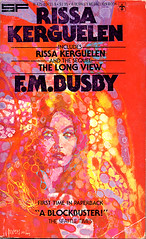 "The Long View" (nv) (Rissa Kerguellen series 2) © 1976, Berkley / Putnam Some maintain that this is a fun space opera, but I say that it heralds the arrival of many overlong pointless mass-market epics, without the necessary sense of grandeur, true glory, or even the basic sense of wonder. This trilogy still has quality, and some signs of aforementioned "senses", but it still shows the coming decline of space adventure in paperbacks. 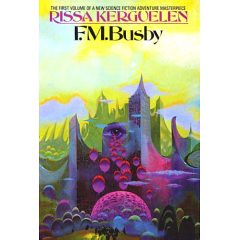 "Rissa Kerguellen" (omnibus edition) (also as "Young Rissa" and "The Long View") (Rissa Kerguellen series) © 1976, Berkley / Putnam This is undeniably "a cult series", as it even has a fan website specially dedicated to it. Just as "sword & sorcery" sub-genre dubiously reigned in the 70ties fantasy, so large-scale "BattleStar Galactica"-type paperbacks flooded the shelves of science fiction. I can understand all the rage around Rissa Kerguelen, though - just think, "at five, they slaughtered her parents and doomed her to slavery. At seventeen, she escaped from Earth as a million-dollar fugitive. At eighteen, she commanded an army in outer space." Perfect feminist vehicle, told with broad strokes on a big canvas (read - with tons of pages, unnecessarily added between gaudy front and back covers) I will suspend my judgment on this one, as it merits certainly more than just a place in a venerable (or vomitable?) "Battleship Earth" category. review: 18-Jul-06 (read in 1986) ----------------------------------------------  Richard Cowper "The Hertford Manuscript" © F&SF, Oct 1976 The Custodians and Other Stories, 1976 --short story : 1977 Locus /7 Some readers call it a loose sequel to "The Time Machine" by H. G. Wells. That's probably a long stretch, but it's still an excellent time-travel story, written in a smooth respectable British style. It deals with the Dark Ages and Black Plague period in history. review: 26-Oct-06 (read in 1994) ---------------------------------------------- 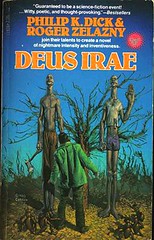 Philip K. Dick "Deus Irae" (nv) (with Roger Zelazny) (based on story "The Great C") © Cosmos # 1, Sep 1953 also in - SF Monthly, Jul 1953 (Austr.) book: Doubleday, 1976 --/ fourth place apocalyptic sf novel --/ wonder award --/ style award When I read this book in my youth, I was bewildered by many passages. There is a lot of angst there, there are no answers, and a general depressing feeling. Sulky automatic car repair robots, and a general post-apocalyptic inventiveness are fine, but a lot of times too much is said about too little. Harder to read in general, but worth it for the moments of beauty among the dystopia. The disillusioned man's quest to paint a picture of a higher being in a post-nuclear-war world. Some call it "the flip-side to "Canticle for Leibowitz". review: 04-Jul-06 (read in 1986) ----------------------------------------------  Harlan Ellison "From A to Z, In the Chocolate Alphabet" © F&SF, Oct 1976 Strange Wine, 1978 --short story : 1977 Locus /11 --/ cool sf story --/ wonder award --/ style award One of the stories Harlan Ellison wrote in a bookstore's window, sitting with a typewriter under the obligation to write a story an hour, or something like that. It is definitely a quick fix, light entertainment - but the idea of using short alphabetized entries is cool, and has been used many times after that. Michael Swanwick used a similar approach in his "Periodic Table of SF Elements". By the way, successful bloggers use the same technique to maximize the profit from their blogs: they split long entries into short "bursts" and keep you coming back for more, all the time counting the AdSense revenue. Ellison did not have a blog in the Seventies, but this story shows he could've made a fortune having one... review: 26-Oct-06 (read in 1989) ---------------------------------------------- 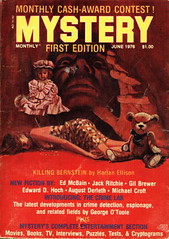 Harlan Ellison "Killing Bernstein" © Mystery Monthly, Jun 1976 Strange Wine, 1978 A forgettable story about the inner workings of the toy-producing industry... but it has a secret. It was written in a bookstore front window, where Harlan Ellison sat behind a typewriter, as a side-show to the passing crowds, typing away a story on the spot. He wrote a complete story each day for six days, proving that... he can write a story in a window, I guess. This particular tale is only interesting as a stunt, especially considering that you can not erase your mistakes or edit on a typewriter... review: 4-Sep-06 (read in 1987) ---------------------------------------------- 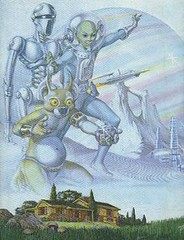 Harlan Ellison "Lonely Women Are the Vessels of Time" © MidAmeriCon Program Book, 1976 Strange Wine, 1978 --/ cool sf story --/ style award --/ emotion award This is an example of less edgy and more lyrical Ellison. By the way, the titles of his stories, put together, can make a poem of its own... but I am sure he knows this secret, and when he runs out of ideas (ha!..) he will publish it as a special edition slip-cased hardcover book. "Lonely women..." is a sad allegory, similar in its forlorn tone to "One Life, Furnished in Early Poverty", bringing the question of loneliness to the ultimate answer of "loving yourself more than your neighbour", and to the ultimate fact of the emptiness of an unsaved soul. Here is one summary of the plot: "Moving from one-night stand to one-night stand and leaving a trail of broken hearts behind him, the protagonist ultimately meets a succubus who is even emptier and more needy than he is." review: 4-Sep-06 (read in 1987) ---------------------------------------------- 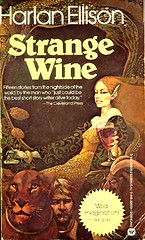 Harlan Ellison "Seeing" © Andromeda # 1, 1976 Strange Wine, 1978 --short story : 1977 Locus /6 --/ third place sf story --/ wonder award --/ style award --/ adventure award --/ emotion award --/ shock value "Cold waterfall of raw emotion, naked wire of pure decadent shock". Such were the words I've chosen to describe this novella (and another one like it - "Catman") when I first read it in 1987. This "Jack Vance-like baroque space opera" reads like a smorgasbord of delectable (and some detestable) "delights" and a catalogue of gaudy styles and bold colors, in the vein of Russian avantgarde art of the Twenties, such as the paintings of Vasily Kandinsky (see example below). Sometimes I think that if you compress Ellison stories, squeeze "pop-culture sensibilities and selling points" out of it and hang it out to dry (to vanquish some self-indulgent tears and other excesses), then you will end up with... poetry of a strangely familiar kind. Mayakovsky, anyone? I'm partly joking, but... Ellison is an event, not a writer. It "happens to you" at some point in your life, and then you are never free from it. This novella deals with the creepy subject of stealing the mutant eyes of another person to better see (and supposedly enjoy) a decadent society, but in the end one can never satisfy the "lust of his eyes" and only would flood the gates of his heart to further insensitivity. Reading Ellison is quite the opposite of that. He cares, and make you care, even if you did not give the subject a second thought a moment before. Certainly a brightest (and baddest) fiction of the Seventies. review: 4-Sep-06 (read in 1987) ---------------------------------------------- 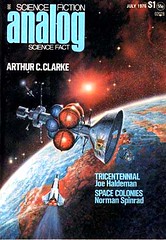 Jo Haldeman "Tricentennial" © Analog, Jul 1976 Infinite Dreams, 1978 --short story : 1977 Hugo W --short story : 1977 Nebula --short story : 1977 Locus W --/ cool space sf story A story about a spaceship that got its engines stuck in the "on" position. Plus, relativistic physics: you can look at a black hole for an eternity and see something being "very slowly" sucked in and stretching out, which in reality happens in an instant. All these ideas are nice, but the story failed to grab me. review: 09-Jul-06 (read in 1992) ---------------------------------------------- Meanwhile, Robert Holdstock takes fantasy by storm in the U.K. - Robert Holdstock "The Graveyard Cross" © Supernova # 1, 1976 In the Valley of the Statues and Others, 1982 --/ fourth place f story --/ wonder award --/ style award With the title like that you would expect a "straight horror" story. But with Holdstock, who is a master of "dripping dark forest fantasy", it becomes something different... a glorious fungus growth of a story. ("The roots go deep, my lord...") It rather works on a reader like a mass of branching threadlike mushroom roots (a mycelium), which propagates the plot, ideas, emotions... You might not remember the details later, but rest assured, it'll keep you enthralled and amazed. Writing reviews to Holdstock's stories is akin to figuring out branch patterns in a dense rainforest: there is no obvious sense, but it does not really matter in the overall humid and cool effect. review: 18-Jul-06 (read in 1991) ---------------------------------------------- 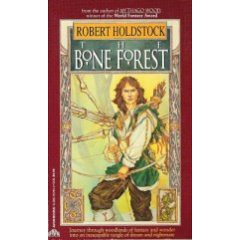 Robert Holdstock "The Time Beyond Age" © Supernova # 1, 1976 The Bone Forest, 1991 --/ cool sf story "A chilling story of the dehumanizing potential of science, and of the obsession of a scientist who has lost his way." This is science fiction, not fantasy, but with the same tangled (complex) and wet-haired (spontaneous) feel to it. review: 18-Jul-06 (read in 1991) ---------------------------------------------- 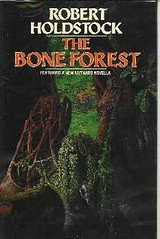 Robert Holdstock "Magic Man" © Frighteners # 2, 1976 The Bone Forest, 1991 --/ cool f story Prehistoric tale about a boy who secretly paints grotesque and gigantic beasts on a sacred wall. The beasts come alive on the plain, to the amazement and delight of his fellow hunters. review: 18-Jul-06 (read in 1991) ---------------------------------------------- 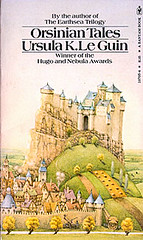 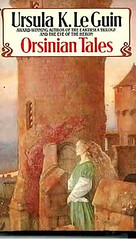 Ursula K. Le Guin "Orsinian Tales" (coll) (Orsinian / Malafena) © 1976, Harper books --/ cool f collection --/ style award The setting is a fictional Eastern European country (same setting as in "Malafrena" novel), at different periods in time ranging from the Middle Ages to the 1960s. Middle Ages period stories will hold some enchantment for fantasy fans, and there is no denying the power of "understatement" these stories have. However, my starved for glorious vistas soul could not find enough color in this collection. Even though I appreciate the refreshingly "minimalist" approach to fantasy, bordering on mainstream, that she took here. review: 09-Jul-06 (read in 1985) ---------------------------------------------- Ursula K. Le Guin "The Diary Of The Rose"  © Future Power, ed.J.Dann, 1976 The Compass Rose, 1982 --novelette : 1977 Hugo --novelette : 1977 Nebula --novelette : 1977 Locus /2 --novelette : 1977 Jupiter W --/ cool sf story In this story a therapist comes inexorably to the discovery that the madman whose mind she is exploring is a political prisoner and his illness is dissent. I can certainly relate to that subject matter, having experienced totalitarian state domination myself. review: 09-Jul-06 (read in 1992) ---------------------------------------------- 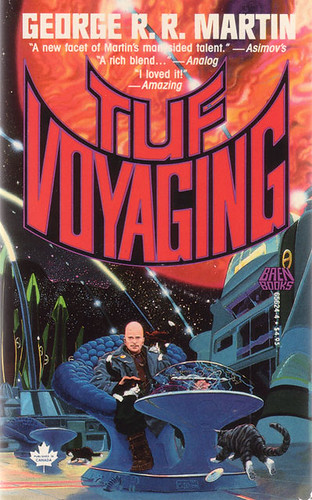 George R. R. Martin "A Beast for Norn" (Tuf series) © Andromeda # 1, ed. P. Weston, 1976 Galaxy, Sep 1979 Tuf Voyaging, 1987 --/ fourth place space sf story --/ wonder award This is an exotic space opera ("animal blood sports") tale, which brings to memory certain prototypes in the pulps... Let's see, how about Jack Vance? Martin himself says: "The first Haviland Tuf story, "A Beast for Norn," was my attempt to capture some of Vance's effects, and Tuf is a very Vancean hero, a distant cousin to Magnus Ridolph, perhaps." It's colorful, has cool alien animals, although does not reach the heights of "Plague Star" in intensity. review: 18-Jul-06 (read in 2001) 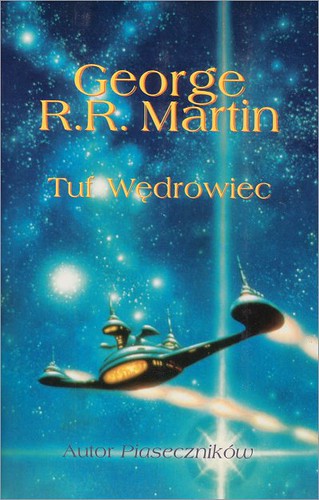 ---------------------------------------------- 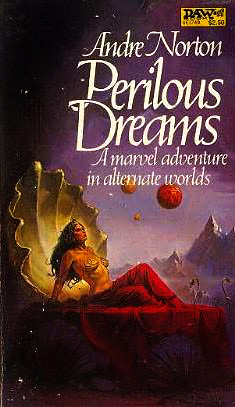 Andre Norton "Perilous Dreams" (nv) © 1976, DAW Books --/ third place sf novel --/ wonder award --/ adventure award There were paperbacks in the seventies approaching the color and enchantment of the best of pulps, after all. Granted, it was harder to find them in the ocean of mediocrity, but if a pulp editor of, say, "Fantastic Adventures" got a hold of this novel, he'd certainly feature Norton as a headliner. Her typical blend of science fiction and high fantasy adventure makes for very entertaining reading: I especially liked the atmosphere and the color of "Ship of Mist". The interconnected stories mix real and dream worlds, star-flung empires and medieval piracy, all told with lucid, vivid prose and pulp-style brevity. It's one of the best Norton books, as her standards slipped in the eighties, but this one is like a pearl in a seashell. Go find it. review: 21-Jul-06 (read in 1987) ---------------------------------------------- 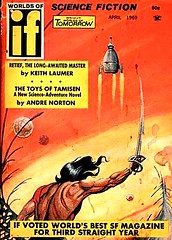 Andre Norton "The Toys of Tamisen" (Perilous Dreams) © IF, Apr 1969 High Sorcery, 1970 Perilous Dreams, 1976 --/ third place sf novella --/ wonder award "It takes place in a future where humanity had long ago reached the stars and scattered itself across thousands of planets. The heroine, Tamisan is a 'true action dreamer to the tenth power' and she can share her dreams (for a certain fee) with others. Lord Starrex is a former space voyager who now lies crippled in the midst of luxury. He can afford the very best Tamisan has to offer and she wants to create a unique fantasy world for him because she senses that he has been everywhere, seen everything, and will not be satisfied with her usual fare. She hits upon the idea of creating an alternate history of their world, where certain key events can be altered by Tamisan to yield a different present". One of the best ever treatments of "actualized dreams" idea. Also see review of "Perilous Dreams". I liked it immensely when I read it in college. review: 21-Jul-06 (read in 1987) ---------------------------------------------- 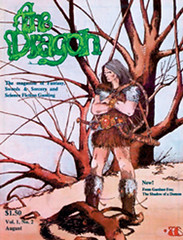 Charles R. Saunders "The Pool Of The Moon" (Imaro series) © Dragon, Aug 1976 --fantasy series : 1982 Aurora --/ cool f novella These were the years of the emergence of "sword & sorcery" into paperbacks and magazines, even many grass-roots 'zines (this story is from one such semi-pro magazine). Typical mindless tale, which I tasted in many forms in the eighties, not finding what I was looking for - the sense of exploration, wonder and real adventure. Most are macho outings to cave in the heads of enemies and little else. review: 18-Jul-06 (read in 1989) ---------------------------------------------- 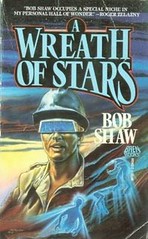 Bob Shaw "A Wreath of Stars" (nv) © 1976, Dell Books --/ cool sf novel --/ wonder award "Ironically, for Gilbert Snook who considered himself the human equivalent of a neutrino (a particle able to travel through the Earth without disturbing any other particle) it all started with the panic that followed the sighting of the anti neutrino planet as it approached Earth. Earth was unaffected but Snook ended up in a small African Republic teaching English to diamond miners. Then the miners started seeing ghosts and Snook found himself at the centre of a bizarre and far reaching scientific discovery and in the middle of some very dirty political infighting." review: 8-Sep-06 (read in 1987) ---------------------------------------------- Bob Shaw "Cosmic Kaleidoscope" (coll)  © 1976, Gollancz --/ third place sf collection --/ wonder award --/ style award Exceptional quality collection, where every story shines. Highly recommended as a showcase of sf delights. review: 09-Jul-06 (read in 1988) ---------------------------------------------- 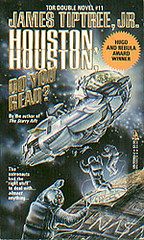 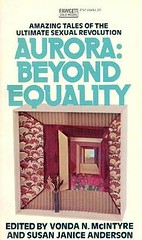 James Tiptree, Jr. "Houston, Houston, Do You Read?" © Aurora: Beyond Equality, ed. V. McIntyre, 1976 Star Songs Of An Old Primate, 1978 --novella : 1977 Hugo W (tie) --novella : 1977 Nebula W --novella : 1977 Locus /3 --novella : 1977 Jupiter W --novella : 1999 Locus All-Time Poll /6 (tie) --/ fourth place sf novella --/ wonder award --/ style award --/ emotion award "The Battle of the Sexes" has a predictable winner in this brilliant novella (predictable, because we know that James Tiptree is the male pseudonym of a woman writer). Surprisingly, the science fiction community did not guess the author's true identity even after this tounge-in-cheek feminist tale. (You can read a great summary on Wikipedia here) The story initially deals with the fate of a crew of three male astronauts falling toward the Sun. Then it develops a familiar feminine domination sub-plot ("I woke up in the future, the only male left in a society of women") I seem to remember there was a popular Polish movie along these lines (IMDB lists is as "Seksmisja" (engl. as "Sexmission"), shown in some countries as "The New Amazons". It was quite an engrossing movie - recommended) The female space-travellers in this story turn out to be wacky clones of a remnant human population from the freshly nuked Earth. They decide to keep astronauts as male specimens, which could spell a bliss or a curse for them, depending on how you look at it. review: 26-Oct-06 (read in 1998) ---------------------------------------------- 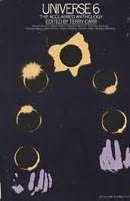 Steven Utley & Howard Waldrop "Custer's Last Jump" © Universe # 6, 1976 --novelette : 1977 Nebula --novelette : 1977 Locus /7 Famous alternate history tale: General Custer, commander of the United States' elite paratrooper brigade, meets his end at the hands of Crazy Horse and a squadron of vintage Confederate monoplanes at the Battle of Little Bighorn - as told alternately in the style of an official Army report, Collier's Magazine, and an unpublished excerpt from Mark Twain's journal. Somebody even compared it to Borges. review: 8-Sep-06 (read in 1987) ---------------------------------------------- 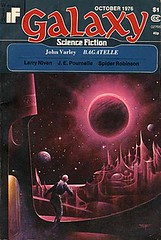 John Varley "Bagatelle" (Anna-Louise Bach series) © Galaxy, Oct 1976 The Barbie Murders, 1980 --novelette : 1977 Locus /9 --/ third place sf story --/ idea award --/ adventure award --/ emotion award --/ shock value "I am rated at fifty kilotons,-the bomb said with a trace of pride" This is how this story starts - not with a whimper, but with a bang. Not just one thrilling bang, but many (you are going to get a lot of bang for your buck, said the cheesy metaphor expert). You also are going to get vintage Varley at the top of his form, which is a lean mean concept car form, not your average soccer wagon blob. When Varley's good, he is very, very good (and maddeningly controversial). When he is bad, you get such rambling and conceited stuff as the "Steel Beach", for example. Here, he has a ball... a bagatelle (a game akin to billiards, with 9 balls) with a nuclear terrorism threat. Nothing funny about that, except a lot of black, chocolaty-dark humour, which receds into an ultraviolet "mad scientist" laugh, resonating over a classic terrorist thriller plot - prepare thyself, for this is going to happen sooner or later. Almost as mad as doctrine of "assured mutual destruction" is the story's concept of "getting rid of conventional armaments and replacing them with reasonably priced hydrogen bombs that would be distributed equally thoughtout the world." You can not even trust the world with candy, not to mention sentient bombs who boast about their megatonne load. "Luckily there are enough humans that losing a few hundred thousand of them to little nukes now and then had no net effect and apparently about the same social effect as the annual tobacco related death rate" or - on other words - "it doesn't bother the anthill much, no matter how many ants get killed..." You have to agree, it's "a conversation starter" story, even today, 30 years later. review: 25-Oct-06 (read in 2003) ----------------------------------------------  Ian Watson "The Girl Who Was Art" © Ambit # 65, 1976 The Very Slow Time Machine, 1979 --/ cool sf story --/ style award This is a highly unusual story, both in subject matter and in masterful narrative technique. A testimony to Ian Watson's skill as a stylist, it has been posted recently in a "Poetry Magazine" online (link here), which marks it as a "poetry in prose" perhaps (at least some passages read like this). It is by no means a masterpiece, but a refreshing occasion in SF genre. An avangardistic take on one photo model's uber-stylish experiences. review: 26-Oct-06 (read in 1994) ---------------------------------------------- Gene Wolfe "The Eyeflash Miracles"  © Future Power, ed. by J. Dann, 1976 The Island Of Dr. Death And Others, 1980 --novella : 1977 Nebula --novella : 1977 Locus /5 --/ cool sf story In typical Gene Wolfe dense, but rewarding style - a bit overlong story about a hobo character who turns out to be a type of "Wizard of Oz"; with many psychological ramifications. The whole story is told from a blind boy's point of view, so it requires a bit of an effort. review: 09-Jul-06 (read in 1992) ---------------------------------------------- A good many books which appeared on the shelves in the Seventies were only of passable quality and very forgettable. You can perhaps blame the paperback industry that demanded more and more novels (not stories) without a good editorial guidance or taste. There is a smattering of stuff (even from established writers) that did not make the grade in my list... HOWEVER, in Russia at this time you could read some truly memorable science fiction, which admittedly had been written in the Sixties, and only now made it to the shelves (due to the "Evil Empire"'s publishing industry red tape). Also one might say that the development of Russian SF lagged 20 years behind the West anyway, so if you add up all these years, you'll arrive at the Forties in science fiction history - paralleling the Seventies in Russia's real world. Which is a nice thought to have, as it indicates a Golden Age of the sense-of-wonder type of story. Of course, communist editorial policies ensured there was no social commentary or political context in these stories, but in terms of sheer grandeur of space adventure, the Seventies were a time to make a SF reader very happy. Witness Sergei Snegov epics, "Relict" series of Golovachev, and a multitude of space adventure writers published in this decade - all in the wide-eyed, innocently optimistic style of the best of american "wonder" pulps. Unfortunately, all these writers are virtually unknown in the West. So here are a few reviews to fill you in: ---------------------------------------------- 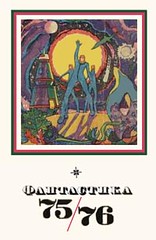 Askold Yakubowski "Kosmicheski Blustitel" (nv) (Аскольд Якубовский "Kосмический Блюститель") (engl. as "Space Cop") © Fantastika - 75/76, 1976 --/ third place space sf novel --/ adventure award --/ wonder award --/ rare find Perfect pulp-style space adventure, which could have appeared in "Thrilling Wonder Stories" in the thirties, and might've given Edmond Hamilton, Brackett and others a run for their money. A planet with an ecology gone berserk: there are huge predator slugs, murderous jungle monsters etc. A cyborg upholds interstellar law throughout this vigorous environment, making this novella a cross between "Robocop" and Harry Harrison's "Death World". All written in a crisp, imaginative style, clean and gorgeous in its wide-eyed wonder and action. One of the first SF thrillers I've read, a great substitute for the american "Planet Stories" pulps I missed as a kid. review: 10-Sep-06 (read in 1983) ---------------------------------------------- 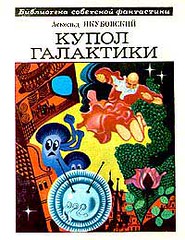 Askold Yakubowski "Kupol Galaktiki" (coll) (Аскольд Якубовский "Купол Галактики") (engl. as "The Dome of the Galaxy") © Molodaya Gvardiya, 1976 --/ second place sf collection --/ wonder award --/ idea award --/ style award --/ emotion award --/ adventure award --/ rare find One of the best space-adventure collections of stories in history of SF. Incredibly spare, vivid prose combined with a level of excitement and wonder, which would have made the best American SF pulp mag from the Forties proud. I am truly happy to have been able to read that stuff in the original language. The full review of all stories will be forthcoming, but for now I only might say that somebody's gotta translate it (I'd do it if I had time), and it's a shame nobody knows about this writer in the West. review: 10-Sep-06 (read in 1984, 2004) ---------------------------------------------- Askold Yakubowski "Na Dalekoi Planete"  (Аскольд Якубовский "На Далекой Планете") (Engl. as "On the Far Planet") (Fitakh series) © Kupol Galactiki, 1976 --/ third place space sf story --/ wonder award --/ adventure award --/ emotion award --/ idea award --/ awesome scale --/ rare find Here is one story from that incredible collection "The Dome of the Galaxy". I read it only a couple of years ago, having read many wonderful planetary adventures before, but this story still rates with the best of them in my opinion. It sparkles with the quintessential wonder of a new, truly alien world. A top contender for the title of "Awesome Exploration Travelogues" in the blog (or magazine) of interstellar era, this tale is short and sweet, pure vintage "imagination candy". review: 10-Sep-06 (read in 2004) ============================================= This is only a short sample of October 1976 stories, many more have been published in the original anthologies (1974-1977 were the prime years for themed anthologies). 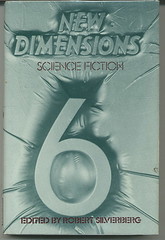 Full review of the wonderful anthology "NEW DIMENSIONS #6", edited by Robert Silverberg, which was a highlight of 1976, you can also read HERE The 1970ties undoubtedly were "The Golden Age of Original Anthology" - and the "New Dimensions" series was one of the most ground-breaking and truly "original". I enjoyed the sense of unpredictability and generally high submission standards that Silverberg maintained as an editor; these books liberated my mind in many good and wonderful ways. ---------------------------------------------- George Alec Effinger "Target: Berlin!" © New Dimensions # 6, 1976 Live! From Planet Earth, 2005 --/ idea award Alternate history, as the title suggest, but so much more. Effinger's tales are always unconventional and go on unexpected "rabbit paths". Overall clever presentation - absurdist take on a decades-delayed World War II, fought now with... cars. review: 18-Jul-06 (read in 2001) ---------------------------------------------- James Tiptree, Jr. "The Psychologist Who Would Not Do Awful Things To Rats" © New Dimensions # 6, 1976 Star Songs Of An Old Primate, 1978 --novelette : 1977 Locus /6 --/ cool sf story More than the simple future "animal rights" story. Tiptree is a woman, yes (Alice B. Sheldon's pen-name), but every time fools the audience. She served in the Army Intelligence and Air Corps; in the psych lab she and her colleagues had used rats as subjects, in a form of unquestioned power relationship that can be disturbing as seen in this story. review: 18-Jul-06 (read in 1987) ---------------------------------------------- Rachel Pollack "Is Your Child Using Drugs?" © New Dimensions #6, 1976 Burning Sky, 1999 --/ style award "...Playing with form: "Is Your Child Using Drugs? Seven Ways to Recognize a Drug Addict" creates a discomfiting fictional universe using questions from a propagandistic anti-drug pamphlet as cues" review: 18-Jul-06 (read in 1987) ---------------------------------------------- Felix C. Gotschalk "Charisma Leak" (Dome series) © New Dimensions # 6, 1976 --/ fourth place sf story --/ wonder award --/ idea award Felix Gotschalk was perhaps the most brilliant - and the most under-appreciated - of the SF writers in the Seventies; his style was way ahead of its time, and belongs with the cyberpunk (or even the post-modern) school, his ideas are plentiful and original enough to stick in the mind for days, like, say, a rainbow-painted mafia coffin. His "shattered glass" prose is intense and may be tiring in large doses - in other words, he may be a classified genius, whose work still waits to be discovered by the average Amazon / Chapters crowd. Most of his stories are about geriatrics in an "old folks" future Dome, who are slowly going nuts (and yet becoming more "hip" in the process). This story is about someone who's suffering from too much charisma: a person with three in-built charismatic personalities... so he needs to cut some of these personalities off in a suicidal move, leaving behind... well, let's just say, this was an ill-considered move. review: 18-Jul-06 (read in 1987) ---------------------------------------------- Marta Randall "Secret Rider" © New Dimensions # 6, 1976 --/ fourth place sf story --/ wonder award --/ style award --/ awesome scale --/ romance award The phrase "John Albion was/is/will be living/dying/dead; sucked into the dead/dying void... conjugate the tenses of time travel" even made it into the "SF Quotations" book. Another quote opens the story: "Foundering between eternity and time, we are amphibians and must accept the fact." (Aldous Huxley). And one other quote - great lines for the opening to the story: "She had followed him across the galaxy. Twice" This is very competent space/time adventure, with touching love story spanning ages and light-years. review: 18-Jul-06 (read in 1987) ---------------------------------------------- Tom Reamy "Dinosaurs" © New Dimensions # 6, 1976 San Diego Lightfoot Sue, 1979 --/ fourth place apocalyptic sf story --/ wonder award --/ style award --/ shock value Vintage and exciting view of the post-apocalyptic world, with many restrictions on eroticism removed, with people living underground and silicone life-forms reigning above. One of the last "classic" approaches to such a conventional scenario. Done with intensity and style. review: 18-Jul-06 (read in 1987) ---------------------------------------------- Philip Jose Farmer "Osiris on Crutches" © New Dimensions # 6, 1976 Stations of the Nightmare, 1982 --/ cool f story --/ shock value This is a "tongue-in-cheek" story with some unspeakable subject matter and taboo elements. But in some ways it is no more explicit than some Greek / Egyptian mythology, in fact based upon one such myth, and ridiculing the bizarre excesses of ancient world's collective imagination. In breaking many conventions, this original gem embodies the value of whole "New Dimensions" anthology series: wilder, weirder, edgier - building upon "Dangerous Visions" tradition. Respect. review: 18-Jul-06 (read in 1987) ============================================== 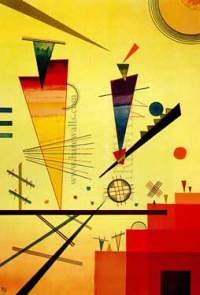 "Structures" by Vasily Kandinsky (1924) Return to the Wonder Timeline Labels: Timeline |
Click to go to "Dark Roasted Blend" site

|
Collecting Pulp Magazines Ephemera Interview with Avi Abrams |

|
Enchanting Victorian Fairy Tale Art "Then world behind and home ahead..." |

|
Exceptional British Scifi Artwork from the 1950s Space Pulp Art by Ron Turner and other British artists |

|
Pulp Pleasures: Eando Binder Great space adventure fiction from the 1930s "Where Eternity Ends" and other rare gems |
Also read recent posts:
Author's Pen Names - Most Complete List Ever
The Wonder Timeline: SF&F Restrospective
Space Adventure Article
|
"SF&F Reading Experience" is part of "Dark Roasted Blend / Thrilling Wonder" family of sites. We try to highlight the most entertaining and rewarding science fiction and fantasy, with emphasis on memorable reader experience, not necessarily general acceptance by the critics. Have fun, and delve into our extensive ratings and reviews! Most reviews are written by Avi Abrams, unless otherwise noted. Reviews also appear on our unique historical retrospective page Wonder Timeline of Science Fiction. Feel free to submit your own review, if a particular story is not listed here. All major OFFICIAL AWARDS are highlighted in BLUE ("winner" has a letter "W" by it, otherwise it is a runner-up only) Our PERSONAL AWARDS (ratings) are highlighted in RED and PURPLE: --/ first place : --/ second place : --/ third place : --/ fourth place : --/ cool : (equal to fifth place) ALL "BEST OF" LISTS ARE LOCATED HERE These awards are given in the following categories: - novel : - series : - novella : - story : - collection : Also, there are our personal STYLE / GENRE SPECIFIC AWARDS. These reflect the story's content and the lasting impression on the reader: --/ wonder award sense-of-wonder, "visual intensity" and inventiveness --/ idea award originality of idea / concept --/ adventure award exhilarating plot, excitement / action --/ style award outstanding literary qualities, inimitable style --/ romance award intense and beautiful love / relationships --/ humour award funny and cool --/ emotion award touching, lasting impression, sensitivity --/ shock value altogether wild --/ awesome scale mind-boggling; further enhances sense-of-wonder --/ rare find very hard to locate, mostly from old pulps, never reprinted, etc. Again, please feel free to leave your own review or comment under every writer's entry; also recommend us other stories you liked. |

0 Comments:
Post a Comment
<< Home